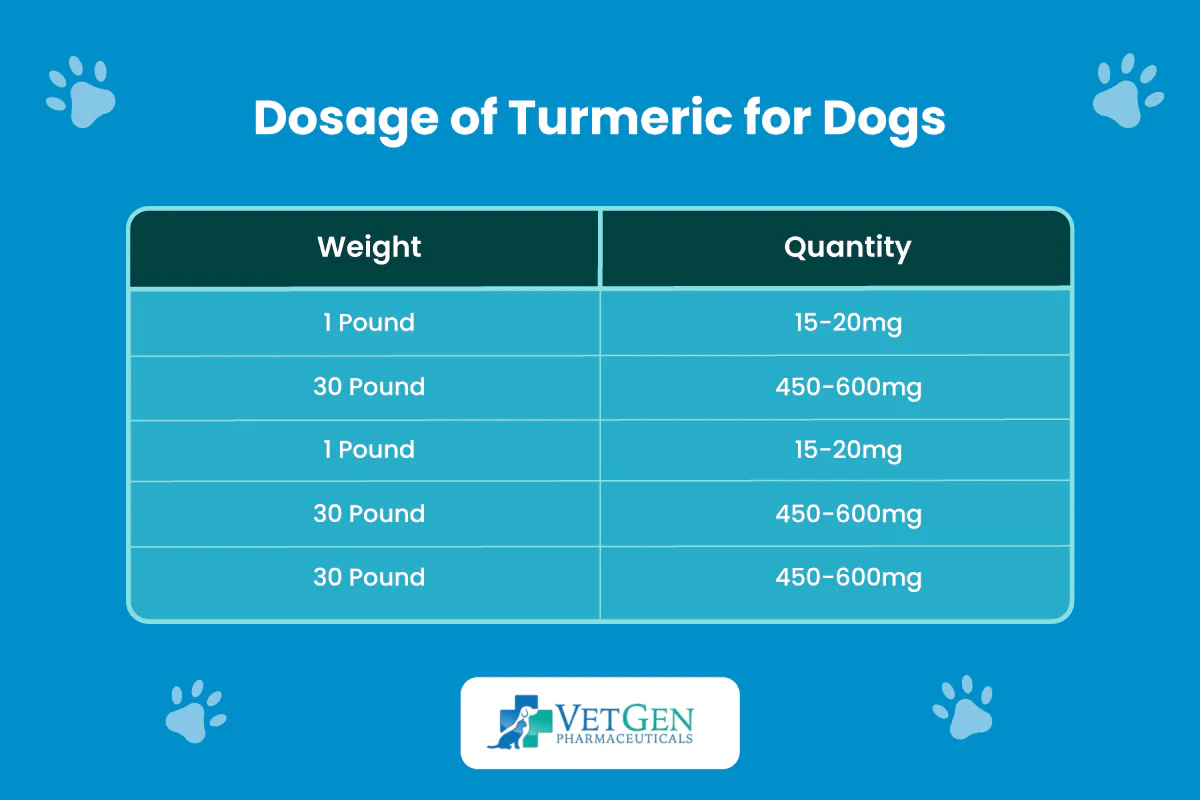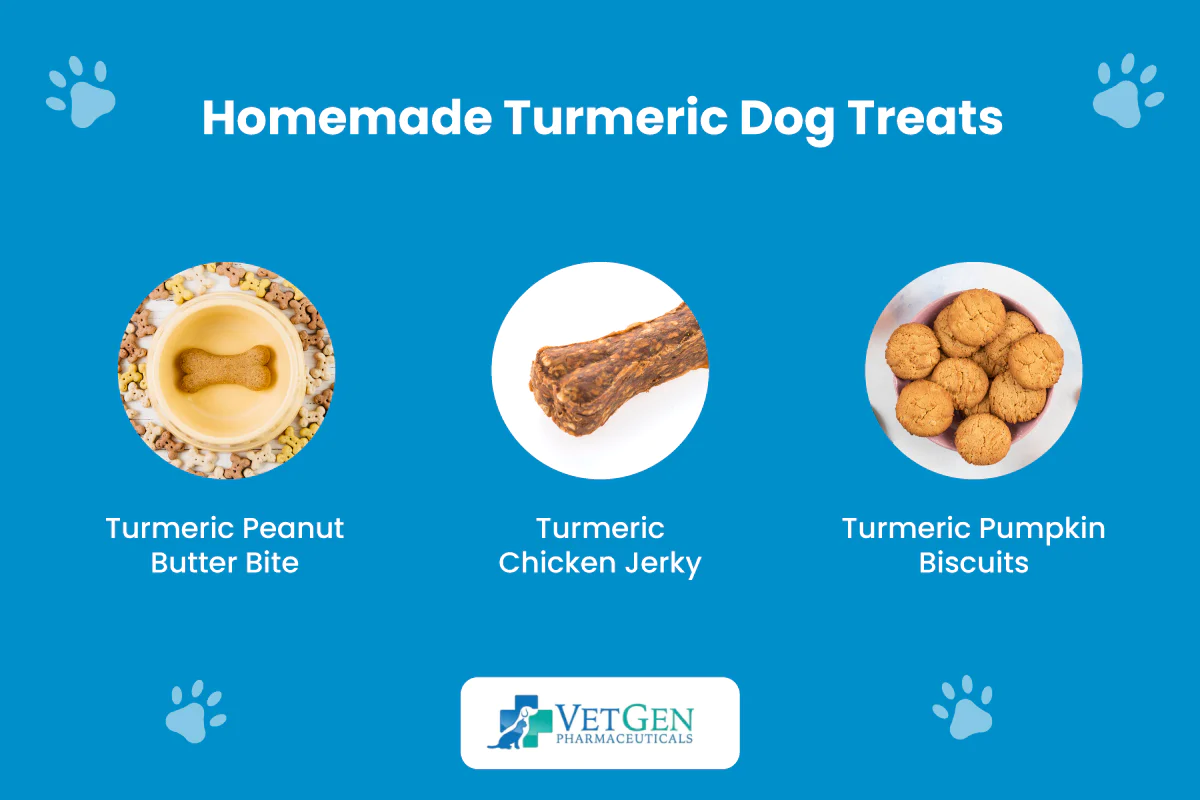Introduction
Do you often find your furry friend struggling with joint pain, and you’re left wondering what natural remedies could help? Here’s a surprising fact: Turmeric, the spice that gives curry its yellow color, can be an incredible ally in combating canine arthritis.
In this blog, we talk about how turmeric benefits dog joints, from reducing inflammation to improving mobility.
Key Takeaways

- Turmeric contains curcumin with antifungal, antiviral, antibacterial, and anti-inflammatory properties.
- Dogs can safely consume turmeric for joint health.
- It fights free radicals, supports heart health, and aids arthritis.
- It is a natural remedy for dog arthritis and joint issues.
- It reduces arthritis-related swelling and discomfort.
- It is an alternative to steroids for dog joint pain.
- It addresses gastrointestinal disorders and promotes gut health.
- It improves joint mobility, alleviates discomfort in older dogs, and may prevent cancer.
Can Dogs Eat Turmeric?
Dogs can safely eat turmeric, which offers numerous benefits for their overall health and joint function.
Benefits of Turmeric for Dogs
Turmeric is more than just a spice to some of your favorite dishes – it’s a powerhouse of health benefits for your beloved pets too! It is packed with curcumin, an ingredient known for its antifungal, antiviral, antibacterial, and anti-inflammatory properties.
Turmeric in your dog’s diet can improve overall wellness by fighting harmful free radicals that cause cell damage. It also contributes to heart health by reducing cholesterol and minimizing the risk of blood clots.
For older dogs dealing with the affliction of arthritis, turmeric can alleviate discomfort and stiffness by decreasing swelling in affected joints. Notably, besides improving joint mobility and promoting better sleep due to effective pain management, it serves as a preventive agent against cancer formation by combating chronic inflammation.
Whether it’s sprinkled on food or given as chewable supplements – integrating turmeric into your dog’s dietary regimen could significantly enhance their quality of life.

Safety of Turmeric for Dogs
Turmeric has many good effects on dogs and can be added to their food safely if done right. The yellow powder from the Turmeric plant is strong at stopping damage from bad molecules and reducing swelling, which helps their joints feel better.
It also works with medicines for arthritis, tummy problems, steroids, cancer treatment, and stuff that helps with swelling. But, just like with new food, give a little at the start and see how it works for your dog.
Also, remember that while turmeric can help dogs in big ways – like making their heart better by lowering bad stuff or fighting inflammation to stop cancer – it’s not magic. It can’t replace the vet or important meds.
Appropriate Dosage of Turmeric for Dogs
Administering the correct dose of turmeric to your furry friend is critical for their health and well-being. Generally, the recommended dosage of turmeric for dogs is 15-20mg per pound of body weight per day.
This means if you have a 30-pound dog, they should consume between 450 and 600mg of turmeric daily. It’s crucial that dog parents start with a smaller amount first and monitor their pet’s reaction before gradually increasing it over time.
While it has plenty of potential benefits for dogs’ joints, too much can be harmful. So stick to appropriate dosages when providing this natural supplement to ensure optimal joint health in your canine companion without any unforeseen complications.

How Turmeric Affects Dog Joints
Turmeric’s anti-inflammatory properties reduce joint inflammation and can provide relief for dogs with arthritis or other joint issues.
Anti-inflammatory Properties of Turmeric
Turmeric’s anti-inflammatory properties make it a powerful natural remedy for dogs with joint issues. The active ingredient, curcumin, helps to reduce inflammation in the body, alleviating pain and swelling.
By incorporating this into your dog’s diet, you can effectively manage inflammation and promote better joint health. It’s supplements or adding freshly ground turmeric to their meals are great ways to introduce this beneficial spice into their routine.
It’s important to start with small amounts and monitor your dog’s response, ensuring they do not have any adverse reactions. With regular use, it can provide much-needed relief.
Potential Benefits of Turmeric for Dogs With Arthritis
Potential benefits for dogs with arthritis have been demonstrated through the use of turmeric. Turmeric, for dogs suffering from chronic pain in joints, contains an antimicrobial property that can help to decrease swelling and discomfort of the joints.
Turmeric contains curcumin, which acts as a natural pain reliever and antioxidant, helping to improve overall joint health. By incorporating this into your dog’s diet or giving them a turmeric supplement, you may be able to alleviate some of their arthritis symptoms naturally.
Regular use of it can also assist other medications commonly used to treat arthritis in dogs, making it an attractive holistic option for managing joint pain. Read more about Foods For Dogs With Arthritis – The Dos And Don’ts.
Effectively Supplementing Turmeric in Dog Food
To effectively supplement turmeric in your dog’s food, start by introducing a small amount and gradually increasing the dosage over time. Mix it with healthy fats, such as coconut oil or olive oil, to enhance absorption.
Use freshly ground turmeric for maximum potency, and add a pinch of black pepper to increase bioavailability. Consider cooked or heated preparations to release more beneficial compounds from the turmeric.
Finally, closely monitor your dog’s response to ensure they are tolerating the supplementation well.

Starting with a Small Amount
To effectively supplement turmeric in your dog’s food, it’s important to start with a small amount and gradually increase the dosage. This allows your furry friend’s digestive system to adjust and prevents any potential adverse reactions.
Begin by adding just a pinch of turmeric or turmeric root to their meal.
By starting with a small amount, you can also monitor how well your dog responds to the turmeric. Keep an eye out for any changes in their behavior or digestion. Owners can gradually increase the quantity over time.
Remember that while turmeric is generally safe for dogs, each pup is different, so it’s essential to pay attention to their individual needs and reactions. By introducing turmeric slowly into their diet, you’ll be able to ensure that it benefits them without causing any harm.
Mixing with Healthy Fats
To effectively supplement turmeric in your dog’s food, consider mixing it with healthy fats. Incorporating healthy fats into your dog’s diet not only enhances the benefits of turmeric but also helps with its absorption.
There are several health benefits for dogs from the compound curcumin, which is derived from turmeric., including its anti-inflammatory properties. When combined with healthy fats like coconut oil or olive oil, curcumin becomes more bioavailable to your dog’s system, allowing them to reap the maximum benefits.
So go ahead and add a small amount of turmeric mixed with some healthy fats to your furry friend’s meal and watch their joint health improve over time!

Using Freshly Ground Turmeric
To effectively supplement turmeric in your dog’s food, using freshly ground turmeric is key. Freshly ground turmeric contains higher levels of curcumin, the active ingredient that provides many of the health benefits for dogs.
By using fresh turmeric, you ensure that your pup gets the maximum potency and effectiveness from this natural anti-inflammatory powerhouse. It’s best to start with a small amount and gradually increase it as you monitor your dog’s response.
Mixing freshly ground turmeric with healthy fats like coconut oil or olive oil can enhance its absorption by the body.
Monitoring the Dog's Response
It’s important to monitor your dog’s response when introducing turmeric into their diet. While turmeric is generally safe for dogs, every dog is unique and may react differently. Start by adding a small amount of turmeric to your dog’s food and observe any changes in their behavior or health.
Look out for signs of nausea, vomiting, diarrhea, itchiness or any other negative symptoms, reduce the amount of turmeric or consult with your veterinarian for guidance.
By closely monitoring your dog’s response, you can ensure that turmeric is being effectively supplemented in their diet without causing any adverse effects on their overall well-being.
Turmeric Supplements for Dogs
Turmeric supplements for dogs provide a convenient way to incorporate the benefits of turmeric into their diet, promoting joint health and reducing inflammation.
Read more about the effectiveness of turmeric for canine joint pain relief.
Availability and Where to Buy
Turmeric supplements for dogs are becoming increasingly popular, and lucky for dog parents, they can easily be found at local grocery stores or health food stores. Turmeric chews and supplements specifically formulated for dogs can also be purchased from reputable pet stores or websites.
Look for quality options that are manufactured using naturally occurring ingredients and free from harmful additives when looking for turmeric products. In addition, the selection of a turmeric supplement specially formulated for dogs is important to ensure that they receive an adequate dose.
By incorporating this natural remedy into your dog’s routine, you can provide them with potential joint support in a convenient and accessible way.
Choosing the Right Turmeric Supplement
When it comes to choosing the right turmeric, there are a few key factors to consider. Here are some important guidelines to follow:
Look for a curcumin supplement specifically designed for dogs. Curcumin provides numerous health benefits. Make sure the supplement is formulated with dogs in mind to ensure proper dosage and efficacy.
Opt for natural anti-inflammatory options. Turmeric supplements made with organic or all-natural ingredients are preferable as they minimize the risk of harmful additives or chemicals that could potentially harm your dog’s health.
Consider joint health supplements for dogs. Turmeric supplements that target joint health can be beneficial if your dog has arthritis or other joint issues. Ingredients such as glucosamine, chondroitin, or omega-3 fatty acids can further support joint function and mobility.
Choose supplements that support immune system health. Turmeric’s antiviral and antioxidant properties can boost your dog’s immune system and help fight off infections and allergies. Look for turmeric supplements that specifically mention immune system support on the label.
Homemade Turmeric Dog Treats
One great way to incorporate turmeric into your dog’s diet is by making homemade turmeric dog treats:ey.
Instead, such diets usually employ other types of carbohydrates including potatoes, yams, green peas, lentils or beans. The concept of grain free diets is conceived from the fact that since dogs are the descendants of wolves, they are not in a position to digest grains.

Turmeric Peanut Butter Bites:
- Mix 1 cup of natural peanut butter with 1 teaspoon of turmeric powder.
- Add in ½ cup of rolled oats and stir until well combined.
- Roll the mixture into small balls and place them atop a baking sheet with parchment paper.
- Freeze the bites for about an hour.
Turmeric Pumpkin Biscuits:
- Heat your oven to 350°F (175°C) and line a baking sheet with parchment paper.
- In a bowl, combine 2 cups of whole wheat flour, 1 teaspoon of turmeric powder, and ½ cup of canned pumpkin puree.
- Gradually add water or chicken broth, mixing until you have a firm dough.
- Roll out the dough on a lightly floured surface and cut it into desired shapes using cookie cutters.
- Place the biscuits on the prepared baking sheet and bake for about 20 minutes or until golden brown.
Turmeric Chicken Jerky:
- Preheat your oven to 200°F (95°C) and line a baking sheet with parchment paper.
- Slice boneless, skinless chicken breasts into thin strips.
- In a small bowl, mix together 1 tablespoon of turmeric powder, ½ teaspoon of garlic powder, and ¼ teaspoon of ground black pepper.
- Coat each chicken strip with the spice mixture and place them on the baking sheet.
- Bake for around 2 hours or until the jerky is dry and crispy.
Potential Side Effects of Turmeric for Dogs
While turmeric is generally safe for dogs when given in small quantities, it’s important to be aware of the potential side effects. One of the main concerns with turmeric is its ability to thin the blood and potentially lead to bleeding issues if given in excess.
It’s crucial to monitor your dog closely while supplementing them with turmeric, especially if they are already on medication that affects blood clotting. Another possible side effect is gastric upset or digestive disturbances, such as diarrhea or vomiting.
Conclusion
Turmeric can be a beneficial supplement for dogs with joint concerns. Its powerful anti-inflammatory properties can help reduce swelling and pain, enhancing mobility and overall joint health.
However, consulting with a veterinarian is important to ensure your dog’s safety while using turmeric. With the right approach, turmeric can be a natural and effective option for supporting your furry friend’s joint health journey.
Frequently Asked Questions
Can turmeric help improve joint health in dogs?
Yes, turmeric has been known to have anti-inflammatory properties that can potentially help reduce joint inflammation and pain in dogs.
How should I administer turmeric to my dog for joint health?
Before administering turmeric to a dog, it is recommended that you discuss this with your veterinarian. The dosage and form of turmeric supplementation may be provided by professional guidance, such as capsules or powder in combination with food.
Are there any potential side effects of giving turmeric to dogs for joint health?
While generally considered safe, some dogs may experience digestive upset or allergic reactions when given turmeric. It is important to monitor your dog closely after starting any new supplement, including turmeric, and consult with a vet if you notice any adverse effects.
Is it necessary to give my dog additional supplements along with turmeric for joint health?
Every dog’s needs are unique, so it is best to consult with a veterinarian who can assess your pet’s specific condition and recommend an appropriate supplementation plan. In some cases, additional supplements like glucosamine or omega-3 fatty acids may be beneficial in supporting overall joint health along with the use of turmeric.






